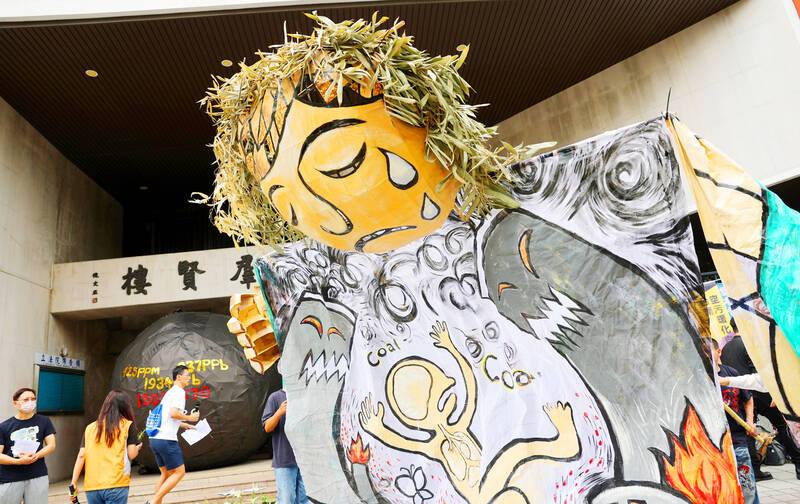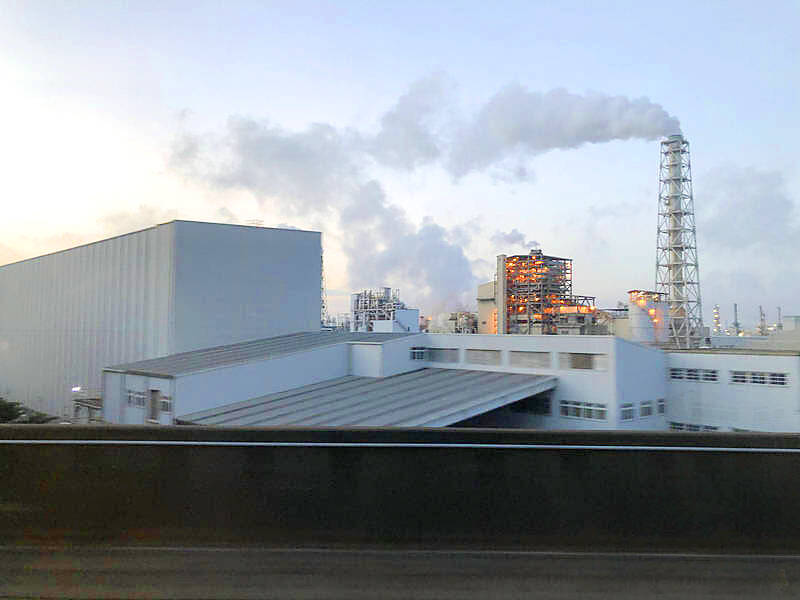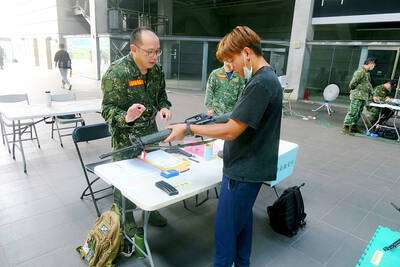Environmental advocacy groups yesterday urged the government to adopt four carbon-pricing strategy proposals, including establishing a carbon fee collection scheme, before the new administration takes office next month.
To mark Earth Day, the groups — including the Green Citizens’ Action Alliance, Environmental Rights Foundation and Homemakers United Foundation — issued a joint statement calling for the government to speed up the establishment of a carbon fee collection system to demonstrate its determination to reduce greenhouse gas emissions.
The groups called for the establishment of a carbon fee rate before May 20 to avoid issues that might delay the adoption of such a scheme after the new administration takes office.

Photo: CNA
If the carbon fee rate is established too late, some sources of greenhouse gas emissions might be minimized in policies, or the government might make excuses for failing to formulate carbon reduction policies in its first year or claim to be unable to retroactively pay the fees on time next year for emissions produced this year, they said.
The groups proposed that the starting price of the carbon fee be set at NT$500 per tonne, in line with international standards.
South Korea’s carbon trading price in 2022 was about NT$540 per tonne, while Singapore this year increased its carbon fee to NT$570 per tonne, they said.

Photo: Chen Chia-yi, Taipei Times
The groups also recommended that the minutes of Carbon Fee Rate Review Committee meetings be published to ensure that the public understands the government’s decisionmaking process and that supervision of it is conducted effectively.
The committee has so far held two meetings, they said.
The statement also called for the formulation of supporting regulation for carbon pricing to facilitate the establishment of a complete carbon fee collection system.

A magnitude 6.4 earthquake struck off the coast of Hualien County in eastern Taiwan at 7pm yesterday, the Central Weather Administration (CWA) said. The epicenter of the temblor was at sea, about 69.9km south of Hualien County Hall, at a depth of 30.9km, it said. There were no immediate reports of damage resulting from the quake. The earthquake’s intensity, which gauges the actual effect of a temblor, was highest in Taitung County’s Changbin Township (長濱), where it measured 5 on Taiwan’s seven-tier intensity scale. The quake also measured an intensity of 4 in Hualien, Nantou, Chiayi, Yunlin, Changhua and Miaoli counties, as well as

Credit departments of farmers’ and fishers’ associations blocked a total of more than NT$180 million (US$6.01 million) from being lost to scams last year, National Police Agency (NPA) data showed. The Agricultural Finance Agency (AFA) said last week that staff of farmers’ and fishers’ associations’ credit departments are required to implement fraud prevention measures when they serve clients at the counter. They would ask clients about personal financial management activities whenever they suspect there might be a fraud situation, and would immediately report the incident to local authorities, which would send police officers to the site to help, it said. NPA data showed

ENERGY RESILIENCE: Although Alaska is open for investments, Taiwan is sourcing its gas from the Middle East, and the sea routes carry risks, Ho Cheng-hui said US government officials’ high-profile reception of a Taiwanese representative at the Alaska Sustainable Energy Conference indicated the emergence of an Indo-Pacific energy resilience alliance, an academic said. Presidential Office Secretary-General Pan Men-an (潘孟安) attended the conference in Alaska on Thursday last week at the invitation of the US government. Pan visited oil and gas facilities with senior US officials, including US Secretary of the Interior Doug Burgum, US Secretary of Energy Chris Wright, Alaska Governor Mike Dunleavy and US Senator Daniel Sullivan. Pan attending the conference on behalf of President William Lai (賴清德) shows a significant elevation in diplomatic representation,

The Taipei City Reserve Command yesterday initiated its first-ever 14-day recall of some of the city’s civilian service reservists, who are to undergo additional training on top of refresher courses. The command said that it rented sites in Neihu District (內湖), including the Taipei Tennis Center, for the duration of the camp to optimize tactical positioning and accommodate the size of the battalion of reservists. A battalion is made up of four companies of more than 200 reservists each, it said. Aside from shooting drills at a range in New Taipei City’s Linkou District (林口), the remainder of the training would be at